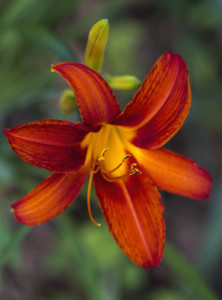Perennials are like older children who can finally tie their own shoes, put on their own clothes and fix themselves a bowl of cereal. They can take care of themselves—much better than those more fragile annuals. They show up in the garden at just the right season and sometimes surprise us when we haven’t paid enough attention.
Some gardeners like a variety of perennials interspersed throughout their yard. Other gardeners have a favorite species they like to focus on. Rose, iris, wildflower and daylily gardens are a few examples of these flowers that have many different varieties. In these gardens with a flower focus, garden markers can help identify the subtle and not so subtle differences between the different cultivars.
 Daylilies are a favorite perennial that thrive in full sun even though they can grow and bloom in partial shade, too. They don’t care much for wet feet, but they are great for reducing erosion when planted on a slope. Daylilies come in a variety of heights and colors. Daylily gardeners suggest that you take notice of a daylily’s height before planting and realize that the listed height of the daylily is the height from the ground to the top of its bloom.
Daylilies are a favorite perennial that thrive in full sun even though they can grow and bloom in partial shade, too. They don’t care much for wet feet, but they are great for reducing erosion when planted on a slope. Daylilies come in a variety of heights and colors. Daylily gardeners suggest that you take notice of a daylily’s height before planting and realize that the listed height of the daylily is the height from the ground to the top of its bloom.
The clumping, grass-like foliage of daylilies makes them a great filler plant in a flower bed. They can help hide the legs of other less leafy plants and soften the area around a woody-stemmed plant. Those clumps and bright blooms are also perfect for hillsides or slopes where it’s difficult to grow grass. The daylilies help slow erosion and provide a colorful hillside where you don’t have to maneuver a mower.
If you don’t have a yard to play in, don’t feel that you’ve lost contact with daylilies. They will thrive in pots like the annuals that are cultivated for a one-year stint on your patio. Daylilies are not usually thought of as a container plant, but it works. If you have a few from your hillside or lawn to spare you can experiment with them in patio containers.
If you are a member of the American Hemerocallis Society (AHS), a society for daylily collectors, or just have a passion for daylilies, your garden would benefit by having garden markers for daylilies. Markers for daylilies could include whatever information you would find helpful for each type of cultivar. Your markers could include physical features about the daylily or common information like the daylily’s registered name, the daylily’s hybridizer’s name, and the year it was introduced.
If you have a passion for roses, irises, daylilies or other flowers that have many cultivars, then sturdy markers like the ones we create at Kincaid Plant Markers can create a record and history for your garden. Markers for daylilies and other blooms will help keep your garden organized for you and those who visit your field of blooms.
